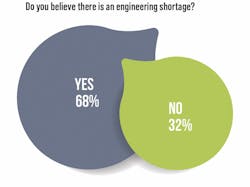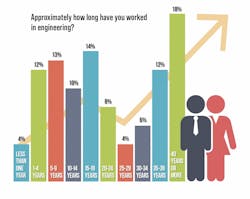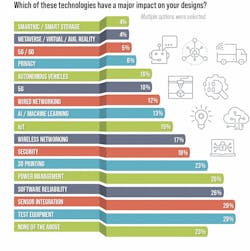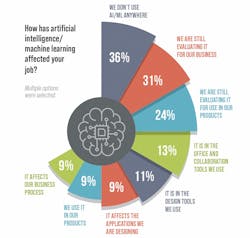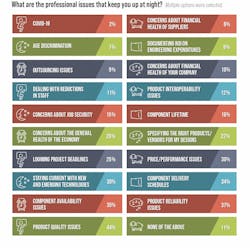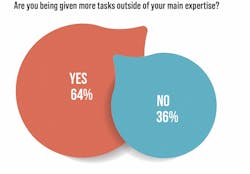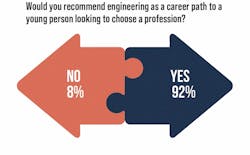A key finding from Power & Motion’s 2023 Salary & Career Survey is not a surprising one – careers in engineering are important to the continued advancement of society yet filling open roles remains difficult.
The majority of survey respondents, just over 68%, said they believe there is an engineering shortage while 63.6% said their organizations are having difficulty finding qualified candidates for open engineering roles. And this is not unique to the fluid power industry. Surveys conducted by affiliate brands to Power & Motion in the electronics and mechanical engineering space had similar results.
Engineering, like many industries, is reaching a point where there is a wave of people retiring and fewer people entering the field. The fluid power sector in particular has noted challenges with attracting new talent as it is not necessarily an area of the engineering field many consider going into.
Efforts are being made by various industry associations and other organizations to educate younger generations about the opportunities in engineering, and fluid power specifically. These efforts may be starting to show as once again in 2023, a large portion of survey respondents – about 28% – noted being in the engineering field under 10 years.
The general consensus from this year’s survey is that a career in engineering can be a rewarding one but more efforts may be required to overcome the shortage of those entering the industry.
Conditions Currently Positive for Engineers
Overall, there appears to be a sense of satisfaction among those working in fluid power engineering roles. The majority of respondents expressed feeling satisfied to extremely satisfied in their current roles, with just 15% indicating they are not satisfied. This was further demonstrated by the fact that just over 90% of survey respondents said they have the same job as they did in 2022.
Aspects which influenced this job satisfaction had a lot to do with the design work involved as well as company culture. About 77% said the challenges which accompany the design of new products were important or very important to their job satisfaction while another 70% noted the opportunity to design products that can benefit society being important to their job satisfaction.
Researching potential design solutions and the pressures associated with solving design problems were also highly rated as important factors.
Compensation was also an important satisfaction factor for many; most respondents, 61%, feel they are being adequately compensated at their current company with 35% saying they believe their employer is competitive with others in the industry in this regard.
However, 27% see their employers as somewhat less competitive regarding compensation compared to other engineering companies. Over half of respondents, 53%, believe an 11-25% pay increase would better align their compensation with the work they do while 28% said just a 1-10% increase would help in this matter.
Most respondents, just over 80%, see their total compensation in 2023 increasing compared to the previous year with many indicating an increase between 1 and 6%. About 23% of respondents expect an increase of over 6%. These compensation expectations are more positive than those from 2022’s survey results – 71% of respondents at that time expected a compensation increase with just 5% expecting one over 6%.
A larger majority in 2022, 23%, expected their total compensation to stay the same as the previous year while in 2023, just 16% of respondents felt this would be the case.
Given performance of the company or the individual, at 63% and 43% respectively, were noted as reasons survey respondents might receive a bonus or other payment above their base salary, it is possible to infer that the total compensation increases expected in 2023 are due to positive market conditions or employers making efforts to retain employees – or a combination of both.
Although most respondents are satisfied with their current jobs, 59% said they would follow up if they learned or were approached about an interesting job opportunity. Another 20% said they are actively seeking a new position while an almost similar amount, 22%, said they could not imagine changing jobs in the foreseeable future.
Job Challenges and Technological Influences
Today, there are a range of industry trends and technological advancements influencing product development – bringing about new design opportunities and challenges for engineers.
Almost 29% of survey respondents said sensor integration is one of the technologies having a major impact on designs. This is not surprising given the increasing use of sensors in hydraulic and pneumatic systems to collect performance data as well as improve control capabilities.
Power management and software reliability were also noted as having a strong influence on designs. Increased emphasis on improving efficiency, due in part to the growth of electrification, and connectivity between systems and machines are likely drivers for this trend.
Also high on the list of technological impacts is 3D printing, with 23% indicating it having a major influence. There are several benefits which can be achieved with 3D printing including the ability to produce more complex geometries as well as lighter weight components. In addition, there is the opportunity to use fewer materials and reduce the amount of machining required to produce a part, benefiting sustainability initiatives.
Use of artificial intelligence (AI) and machine learning (ML) is increasing in many industries, though only 13% of respondents said it is impacting their designs. Thirty-six percent of respondents said they are not using AI or ML in any aspect of their job while 31% said they are still evaluating these technologies for their business and another 24% said they are being evaluated for use in products. Just under 10% said AI and ML are impacting their business or products.
As far as what engineers think of AI and ML, there was an equal response rate at 35% that these technologies have a positive affect on tools and processes as well as not being ready for use in fluid power and needing regulation. Another 33% see these solutions providing a competitive advantage.
Similar sentiments were expressed in the surveys conducted by Power & Motion’s affiliate brands, indicating the use of AI and ML in engineering is still in the early stages.
A number of respondents, 30%, said staying current with new and emerging technologies is a top professional issue keeping them up at night and over 60% of survey respondents said they are being given more tasks outside their main area of expertise.
Increasing development in the areas of electrification, automation, and connectivity, among others, mean electrical and mechanical systems are coming together more than ever, requiring many engineers to expand their knowledge base to ensure optimized performance of the components and systems they are designing.
Most respondents noted product quality issues as the professional issue which keeps them up at night, with just over 43% indicating as such. This was followed closely by 37% noting product reliability issues as a major area of concern. Also high on the list were component availability issues and delivery schedules, indications that supply chains are still a work in progress for many.
Long-Term Potential for a Career in Engineering
Though a career in engineering has its challenges – as any job does – the majority of respondents, 70%, said they believe it to be as promising a career path today as it was 5 years ago. The satisfaction levels and salary potential noted by survey respondents are good indicators of this sentiment.
In addition, many said the fact that roles are starting to open as a wave of engineers begin retiring will offer advancement opportunities for the next generation. Others specified the fact that ongoing technological advancements will require engineers of all types to develop new solutions.
As one respondent put it, “The world is changing faster than ever and will only accelerate. We need engineers to create effective products with these new technologies.”
Another respondent said, “The increase in the rate-of-change of technology is increasing the technology to learn and apply, as well as making it difficult for existing engineers to keep up. This increases the opportunity by making more positions in more new niches, as well as the opportunities that open due to attrition.”
Numerous respondents also noted the lack of people entering the field and the difficulty of finding those with the skills required. Sixty-five percent of respondents said mechanical design was the specialty for which they were having the most difficulty finding qualified candidates. This was followed closely by 51% noting systems engineering as a challenging area to find skilled candidates.
Power, digital, and software were also high on the list of engineering specialties for which it is difficult to find candidates.
READ MORE: The Current State of Engineering
When it comes to filling open engineering roles, there was almost an even split between those who said their companies are looking to increase the number of engineering jobs at their company, 44%, and those who said their company plans to maintain their current level of engineers, 46%. Just 10% said their companies plan to scale back engineering staff.
Thirty-four percent said they see an increase in hiring at their companies though just under 20% said hiring for new positions have been put on hold with some indicating freezes have been placed on hiring other than for replacement of existing positions. Another 13% said budget cuts are being made to their company’s engineering department but there were also 33% which said they see no effect to hiring and budgeting taking place – indicating there is a bit of a mixed outlook in the fluid power engineering industry.
The anticipated market slowdown in 2024 could be a reason for this; growth for fluid power and its customer markets is anticipated to be slow or even flat before ramping up in 2025, so some companies may be holding off on hiring but they will also want to prepare for the growth expected in the remainder of the decade.
Besides hiring more talent, ensuring engineers who already work at a company want to stay there is just as vital. Most respondents, 67%, believe their companies are just as focused on employe retention this year as they were in 2022. For those companies looking to do so, the ability to work in team situations, company culture and value, and recognition from others were all highly rated factors for job satisfaction beyond the design work and compensation levels possible – and therefore aspects companies could keep in mind when looking for ways to retain as well as attract engineering talent.
While many see engineering as a good career path, 43% said they have considered leaving the profession at some point with 50% indicating their desire to try something different as the reason. Other highly rated reasons include doing something less stressful, having more free time and making more money.
Almost 20% indicated they were ready to retire, further signifying the generational shift that is starting to take place in the industry.
Just 5% said they consider leaving because of the poor job outlook for engineers which helps further support the mostly positive sentiments expressed by respondents throughout this year’s survey.
The overwhelming majority of respondents, 92%, said they would recommend engineering as a career path to a young person who is looking to choose a profession. Respondents cited future opportunities, salary potential, an ever-increasing need for engineers, the challenging but satisfying work involved, and the variety of work possible as reasons they would recommend engineering as a career.
One respondent noted that because burnout – which 33% said is a reason they considered leaving the profession – is becoming better understood and handled, “engineering is a very engaging and necessary profession. Engineers can create massive positive change and are consistently challenged to think critically and learn more, which is very rewarding.”
Another respondent said, “Engineering has the tools to let you fly, climb or think out of box.”
With these and other positive sentiments expressed by respondents, it’s clear there remains a bright future ahead for engineering.
About the Author
Sara Jensen
Executive Editor, Power & Motion
Sara Jensen is executive editor of Power & Motion, directing expanded coverage into the modern fluid power space, as well as mechatronic and smart technologies. She has over 15 years of publishing experience. Prior to Power & Motion she spent 11 years with a trade publication for engineers of heavy-duty equipment, the last 3 of which were as the editor and brand lead. Over the course of her time in the B2B industry, Sara has gained an extensive knowledge of various heavy-duty equipment industries — including construction, agriculture, mining and on-road trucks —along with the systems and market trends which impact them such as fluid power and electronic motion control technologies.
You can follow Sara and Power & Motion via the following social media handles:
X (formerly Twitter): @TechnlgyEditor and @PowerMotionTech
LinkedIn: @SaraJensen and @Power&Motion
Facebook: @PowerMotionTech

